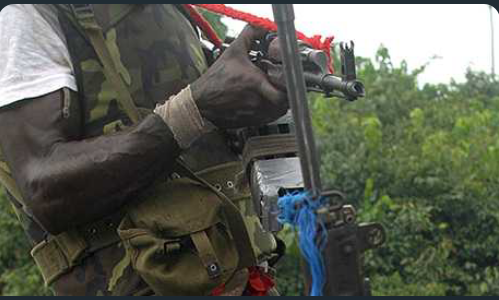Human Rights Writers Association of Nigeria (HURIWA), has condemned the unprecedented killings of Imo state residents.
The group said the killing has become widespread and bloodied due to a failure of political leadership and the refusal of Imo State government and President Bola Tinubu to explore alternative peaceful, negotiated and non-kinetic methodology of conflicts resolution.
Also, the deadly bomb explosion at the Orlu international market on Tuesday, which killed scores of people has been described by HURIWA, as the “clearest evidence that Imo state has sadly become the killing field of South-East of Nigeria.”
HURIWA, in a statement by its national coordinator, Emmanuel Onwubiko, on Wednesday, called for a comprehensive peaceful negotiations and an end to the systematic killings of citizens by both armed non-state and armed state actors.
The rights group, which lamented the killing of Imo people, observed that even the police in Imo has confirmed a bomb explosion in the state.
“The explosion reportedly caused stampede and confusion as people ran helter-skelter, leading to many being injured. It is reported that people were in the market when the explosion was heard and everyone scampered for safety.
“The explosion reportedly caused stampede and confusion as people ran helter-skelter, leading to many being injured. It is reported that people were in the market when the explosion was heard and everyone scampered for safety.
”HURIWA affirmed that it learnt that many innocent bystanders and persons who were in the market for legitimate businesses were reportedly killed by the explosion even as the Imo State Police Command spokesman, Henry Okoye, confirmed the incident. The police spokesperson claimed that two hoodlums have been confirmed dead,” the group said.
HURIWA, which described the incident as outrageous crime against humanity, also condemned the political leaders for failing to unify the people, and convince the federal government to adopt the non-kinetic method of conflict resolution rather than the kinetic method that has turned Imo state to a killing field.
“The truth is that Imo state has since the last four years, degenerated from the peaceful place that it used to be, to a bloody killing field by both armed state and non-state actors. The main reason for these unrelenting killings in Imo state is the clear failure of public office holders in Imo state to bring all Imo state stakeholders and true representations of all the aggrieved groups together to concretely work for peace and progress of the state. Unfortunately the idea by the governments of Imo and central government, that military clampdown is the best solution to the violence in Imo state has led to more bloodshed.
“HURIWA has once more called on Igbo political, civil society, Religious, professional bodies, to unite under a single focal point of immediate restoration of tranquility and economic growth in Imo state. There is the urgent need for genuine dialogues to be held. Political office holders of Imo state origin often do not operate from Owerri even when they ought to live in Imo state so they can leverage on their platforms to unify Imo state people and work out implementable agreements for immediate cessation of conflicts and killings of Imo state people. We appeal to the Imo State governor to be a genuine peacebuilding leader and live in Owerri so that peace can be restored to Imo state by all means humanly possible and especially through genuine negotiations and peace agreements, ” the group said.
Besides, HURIWA has called for the release of Reverend Father Emmanuel Azubuike who was kidnapped by gunmen.
Gunmen recently abducted Rev Fr. Emmanuel Azubuike, the parish priest of St Theresa’s Catholic Parish in Obollo Community, Isiala Mbano Local Government Area of Imo State.
HURIWA said: “We are begging those who abducted Reverend Father Azubuike to release him forthwith because his work is only to contribute to the well-being of his parishioners. Please do not bring any physical harm to him. Free him so the good humanitarian activities of reaching out to the rural Imo state indigenes can go from strength to strength.”


























